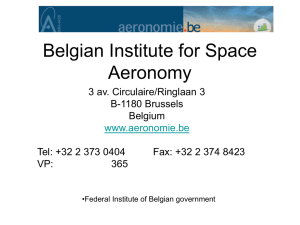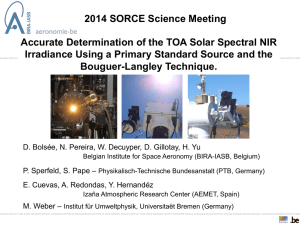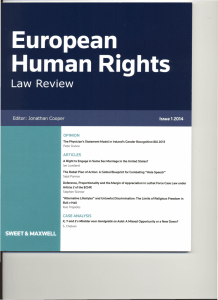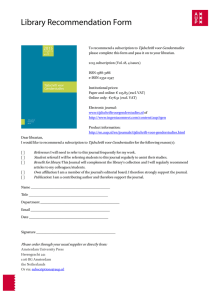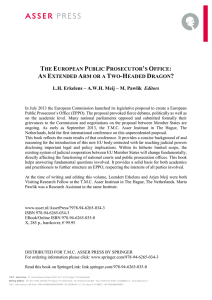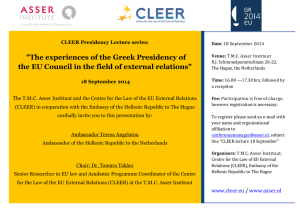Modelling CLUSTER observations of cold ionospheric plasma
advertisement
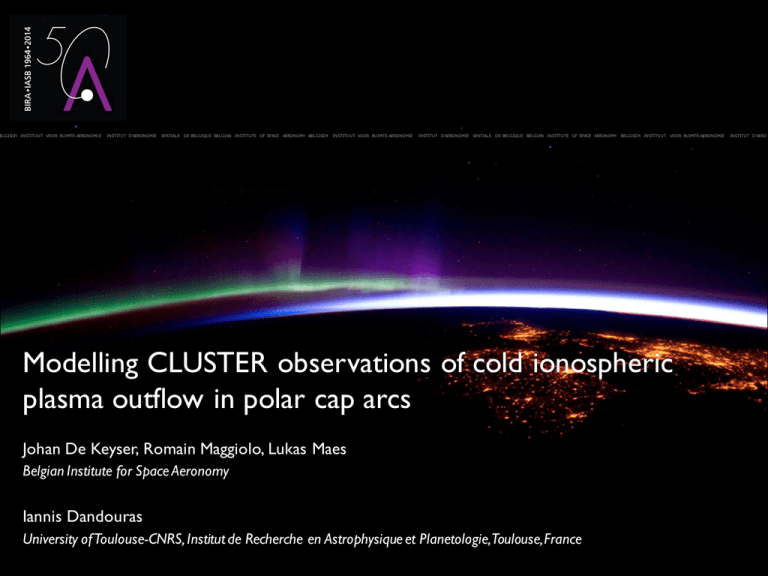
BELGISCH INSTITUUT VOOR RUIMTE-AERONOMI E BELGISCH INSTITUUT VOOR RUIMTE-AERONOMI E INSTITUT D’AERONOMIE INSTITUT D’AERONOMIE SPATIALE DE BELGIQUE BELGIAN INSTITUTE OF SPACE AERONOMY BELGISCH SPATIALE DE BELGIQUE BELGIAN INSTITUTE OF SPACE AERONOMY BELGISCH INSTITUUT VOOR RUIMTE-AERONOMIE INSTITUUT VOOR RUIMTE-AERONOMIE INSTITUT D’AERONOMIE SPATIALE DE BELGIQUE BELGIAN INSTITUTE OF SPACE AERONOMY BELGISCH INSTITUUT VOOR RUIMTE-AERONOMIE INSTITUT D’AERONOMIE SPATIALE DE BELGIQUE BELGIAN INSTITUTE OF SPACE AERONOMY BELGISCH INSTITUUT VOOR RUIMTE-AERONOMIE Modelling CLUSTER observations of cold ionospheric plasma outflow in polar cap arcs Johan De Keyser, Romain Maggiolo, Lukas Maes Belgian Institute for Space Aeronomy Iannis Dandouras University of Toulouse-CNRS, Institut de Recherche en Astrophysique et Planetologie,Toulouse, France INSTITUT D’AERO INSTITUT D’AERO Polar cap ion beams BELGISCH INSTITUUT VOOR RUIMTE-AERONOMI E INSTITUT D’AERONOMIE SPATIALE DE BELGIQUE BELGIAN INSTITUTE OF SPACE AERONOMY BELGISCH INSTITUUT VOOR RUIMTE-AERONOMIE INSTITUT D’AERONOMIE SPATIALE DE BELGIQUE BELGIAN INSTITUTE OF SPACE AERONOMY BELGISCH INSTITUUT VOOR RUIMTE-AERONOMIE Flying above the polar caps at an altitude of 4-5 RE, above the auroral acceleration region, Cluster observes upgoing ion beams of ionospheric composition, with upward flows of up to 200 km/s. [Maggiolo et al., Ann. Geophys., 2006,2011] J. De Keyser et al. – Cluster Workshop 2014 Rhodos, September 2014 INSTITUT D’AERO Associated electric potential BELGISCH INSTITUUT VOOR RUIMTE-AERONOMI E INSTITUT D’AERONOMIE SPATIALE DE BELGIQUE BELGIAN INSTITUTE OF SPACE AERONOMY BELGISCH INSTITUUT VOOR RUIMTE-AERONOMIE INSTITUT D’AERONOMIE SPATIALE DE BELGIQUE BELGIAN INSTITUTE OF SPACE AERONOMY BELGISCH INSTITUUT VOOR RUIMTE-AERONOMIE When integrating E along the spacecraft trajectory, one finds that potential structures are associated with these beams. The beam energy roughly traces this potential, and is typically 100-1000 eV. [Maggiolo et al., Ann. Geophys., 2011] J. De Keyser et al. – Cluster Workshop 2014 Rhodos, September 2014 INSTITUT D’AERO Polar cap arcs BELGISCH INSTITUUT VOOR RUIMTE-AERONOMI E INSTITUT D’AERONOMIE SPATIALE DE BELGIQUE BELGIAN INSTITUTE OF SPACE AERONOMY BELGISCH INSTITUUT VOOR RUIMTE-AERONOMIE INSTITUT D’AERONOMIE SPATIALE DE BELGIQUE BELGIAN INSTITUTE OF SPACE AERONOMY BELGISCH INSTITUUT VOOR RUIMTE-AERONOMIE Such polar cap ion beams appear to be connected to polar cap arcs, as shown in a coordinated Cluster – DMSP study. Such arcs appear shortly after the IMF turns North. [Maggiolo et al., Ann. Geophys., 2012] J. De Keyser et al. - Cluster Workshop 2014 Rhodos, September 2014 INSTITUT D’AERO Conceptual Model BELGISCH INSTITUUT VOOR RUIMTE-AERONOMI E INSTITUT D’AERONOMIE SPATIALE DE BELGIQUE BELGIAN INSTITUTE OF SPACE AERONOMY BELGISCH INSTITUUT VOOR RUIMTE-AERONOMIE INSTITUT D’AERONOMIE SPATIALE DE BELGIQUE BELGIAN INSTITUTE OF SPACE AERONOMY BELGISCH INSTITUUT VOOR RUIMTE-AERONOMIE If the electric circuit is quasistatic with local current closure, such events can be seen as caused by a bipolar msph E-field, i.e. a potential well. M-I coupling produces an upward current with a parallel potential that accelerates - e- down : polar cap arc - H+ and O + up : beams with return current at the edges. J. DeKeyser et al. - Cluster Workshop 2014 H+ msph emsph H+ msph eion o H+, O+ iono eiono INSTITUT D’AERO polar cap arc emission ionosphere surface Rhodos, September 2014 A simple M-I coupling model BELGISCH INSTITUUT VOOR RUIMTE-AERONOMI E INSTITUT D’AERONOMIE SPATIALE DE BELGIQUE BELGIAN INSTITUTE OF SPACE AERONOMY BELGISCH INSTITUUT VOOR RUIMTE-AERONOMIE INSTITUT D’AERONOMIE SPATIALE DE BELGIQUE BELGIAN INSTITUTE OF SPACE AERONOMY BELGISCH INSTITUUT VOOR RUIMTE-AERONOMIE For linear I-V and constant , a simple current conservation model describes the physics: - ∆𝜙>0 inside, ∆𝜙<0 at edges; - as K- > K+ reverse ∆𝜙 is smaller (50-100 V); - v|| (H+ blue, O+ green) traces ∆𝜙 rather than 𝜙msph; - additional 𝐸×𝐵 drift. [De Keyser et al., Ann. Geophys., 2010] J. De Keyser et al. - Cluster Workshop 2014 Rhodos, September 2014 INSTITUT D’AERO The magnetospheric driver BELGISCH INSTITUUT VOOR RUIMTE-AERONOMI E INSTITUT D’AERONOMIE SPATIALE DE BELGIQUE BELGIAN INSTITUTE OF SPACE AERONOMY BELGISCH INSTITUUT VOOR RUIMTE-AERONOMIE INSTITUT D’AERONOMIE SPATIALE DE BELGIQUE BELGIAN INSTITUTE OF SPACE AERONOMY BELGISCH INSTITUUT VOOR RUIMTE-AERONOMIE What creates the magnetospheric potential structure? We model the generator as a plasma slab embedded in the lobe, using a self-consistent 1-D kinetic TD model. Difficulties: - lobe plasma has low energy and low density and thus easily escapes detection. - slab plasma : sometimes – but not always – a hot isotropic ion component is observed. [De Keyser et al., Ann. Geophys., 2013] J. De Keyser et al. - Cluster Workshop 2014 Rhodos, September 2014 INSTITUT D’AERO Magnetospheric structure BELGISCH INSTITUUT VOOR RUIMTE-AERONOMI E INSTITUT D’AERONOMIE SPATIALE DE BELGIQUE BELGIAN INSTITUTE OF SPACE AERONOMY BELGISCH INSTITUUT VOOR RUIMTE-AERONOMIE INSTITUT D’AERONOMIE SPATIALE DE BELGIQUE BELGIAN INSTITUTE OF SPACE AERONOMY BELGISCH INSTITUUT VOOR RUIMTE-AERONOMIE Slab: rather hot plasma (400 eV e-, 1 keV H+) plus H+ and O+ beams accelerated through 500 V. Environment: cold lobe plasma (1 eV e-, 2 eV H+). Strong bipolar E-fields are found at the interfaces. This matches with the observed structures. J. De Keyser et al. - Cluster Workshop 2014 Rhodos, September 2014 INSTITUT D’AERO Conclusions BELGISCH INSTITUUT VOOR RUIMTE-AERONOMI E INSTITUT D’AERONOMIE SPATIALE DE BELGIQUE BELGIAN INSTITUTE OF SPACE AERONOMY BELGISCH INSTITUUT VOOR RUIMTE-AERONOMIE INSTITUT D’AERONOMIE SPATIALE DE BELGIQUE BELGIAN INSTITUTE OF SPACE AERONOMY BELGISCH INSTITUUT VOOR RUIMTE-AERONOMIE Cluster has shown us that polar cap arcs and polar cap ion beams are two sides of the same coin. We have a good understanding of M-I coupling in polar cap arcs. We begin to understand magnetospheric structure thanks to Cluster observations. Still missing: - a coupling of the beam energy to the ∆𝜙 that results from the magnetospheric potential; - computation of the beam density from the energy deposited in the ionosphere by precipitating e-. - the electron beams in the return current regions. J. De Keyser et al. - Cluster Workshop 2014 Rhodos, September 2014 INSTITUT D’AERO Outlook BELGISCH INSTITUUT VOOR RUIMTE-AERONOMI E INSTITUT D’AERONOMIE SPATIALE DE BELGIQUE BELGIAN INSTITUTE OF SPACE AERONOMY BELGISCH INSTITUUT VOOR RUIMTE-AERONOMIE INSTITUT D’AERONOMIE SPATIALE DE BELGIQUE BELGIAN INSTITUTE OF SPACE AERONOMY BELGISCH INSTITUUT VOOR RUIMTE-AERONOMIE We do not have a satisfactory answer (yet) about - the origin of the potential difference between slab and environment; - the mystery of the hot isotropic ions : why are they not always observed? where do they come from? - how do these structures evolve in time? In conclusion: we are still looking for the process at the origin of polar cap arcs – and that has to do with the overall magnetospheric configuration upon a turning of the IMF from S to N. J. De Keyser et al. - Cluster Workshop 2014 Rhodos, September 2014 INSTITUT D’AERO References BELGISCH INSTITUUT VOOR RUIMTE-AERONOMI E • • • • • INSTITUT D’AERONOMIE SPATIALE DE BELGIQUE BELGIAN INSTITUTE OF SPACE AERONOMY BELGISCH INSTITUUT VOOR RUIMTE-AERONOMIE INSTITUT D’AERONOMIE SPATIALE DE BELGIQUE BELGIAN INSTITUTE OF SPACE AERONOMY BELGISCH INSTITUUT VOOR RUIMTE-AERONOMIE Maggiolo, R., Sauvaud, J. A., Fontaine, D., Teste, A., Grigorenko, E., Balogh, A., Fazakerley, A., Paschmann, G., Delcourt, D. and Rème, H.: A multi-satellite study of accelerated ionospheric ion beams above the polar cap, Ann. Geophys., 24, 1665-1684, 2006. De Keyser, J., Maggiolo, R., and Echim, M.: Monopolar and bipolar auroral electric fields and their effects, Ann. Geophys., 28, 2027-2046, 2010. Maggiolo, R., Echim, M., De Keyser, J., Fontaine, D., Jacquey, C., and Dandouras, I.: Polar cap ion beams during periods of northward IMF: Cluster statistical results, Ann. Geophys., 29, 771–78, 2011. Maggiolo, R., Echim, M., Simon Wedlund, C., Zhang, Y., Fontaine, D., Lointier, G. and Trotignon, J.-G.: Polar cap arcs from the magnetosphere to the ionosphere: kinetic modelling and observations by Cluster and TIMED, Ann. Geophys., 30, 283-302, 2012. De Keyser, J., Echim, M. and Roth, M.: Cross-field flow and electric potential in a plasma slab, Ann. Geophys., 31, 1297–1314, 2013. J. De Keyser et al. - Cluster Workshop 2014 Rhodos, September 2014 INSTITUT D’AERO BELGISCH INSTITUUT VOOR RUIMTE-AERONOMI E INSTITUT D’AERONOMIE SPATIALE DE BELGIQUE BELGIAN INSTITUTE OF SPACE AERONOMY BELGISCH INSTITUUT VOOR RUIMTE-AERONOMIE INSTITUT D’AERONOMIE SPATIALE DE BELGIQUE BELGIAN INSTITUTE OF SPACE AERONOMY BELGISCH INSTITUUT VOOR RUIMTE-AERONOMIE INSTITUT D’AERO BELGISCH INSTITUUT VOOR RUIMTE-AERONOMI E INSTITUT D’AERONOMIE SPATIALE DE BELGIQUE BELGIAN INSTITUTE OF SPACE AERONOMY BELGISCH INSTITUUT VOOR RUIMTE-AERONOMIE INSTITUT D’AERONOMIE SPATIALE DE BELGIQUE BELGIAN INSTITUTE OF SPACE AERONOMY BELGISCH INSTITUUT VOOR RUIMTE-AERONOMIE INSTITUT D’AERO Thank you for your attention! J. De Keyser et al. - Cluster Workshop 2014 Rhodos, September 2014
